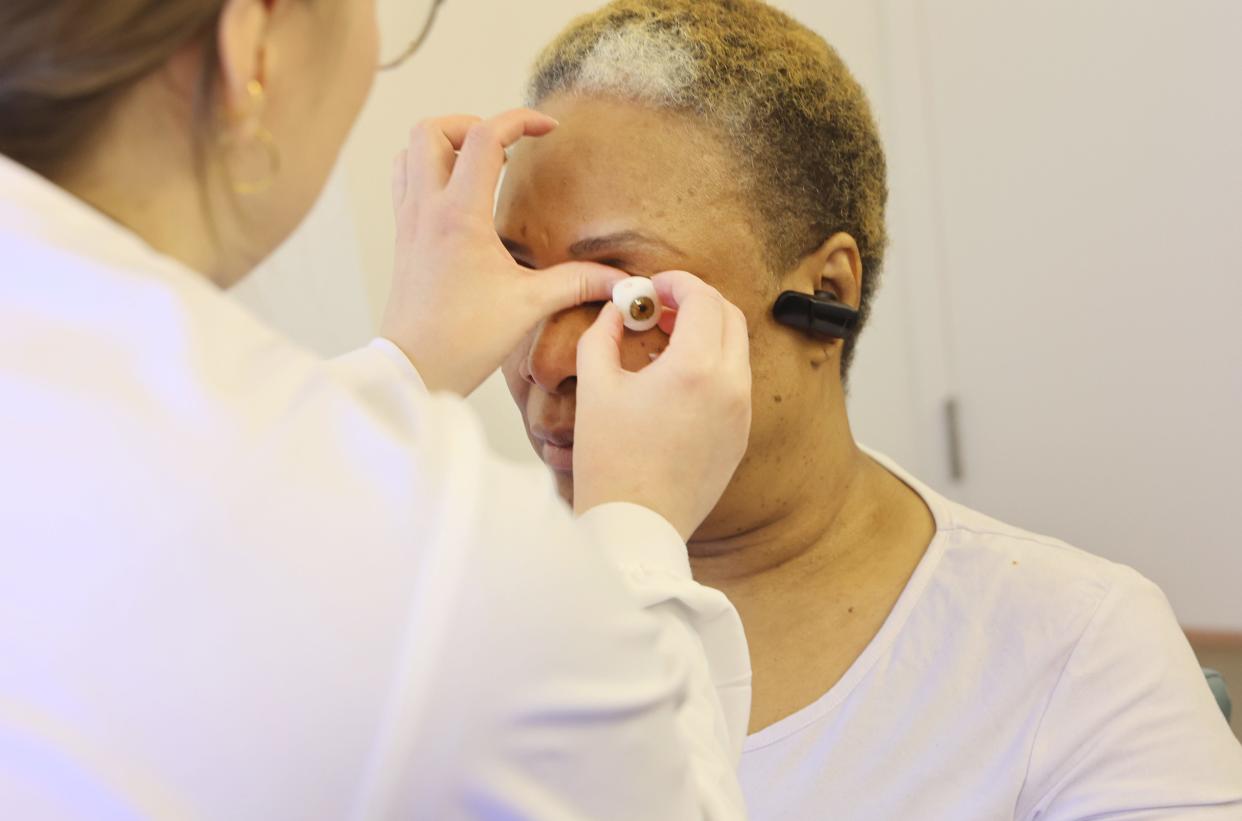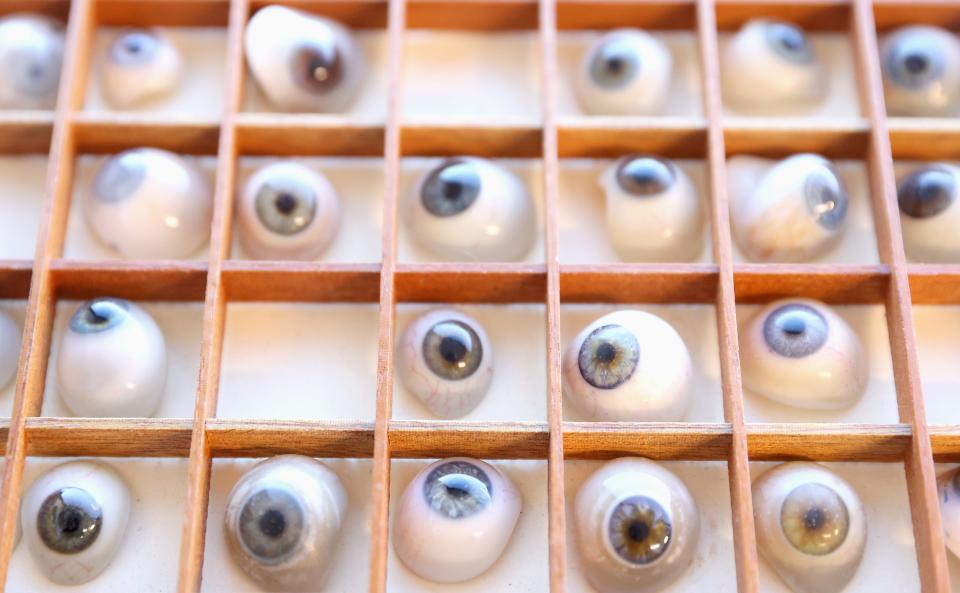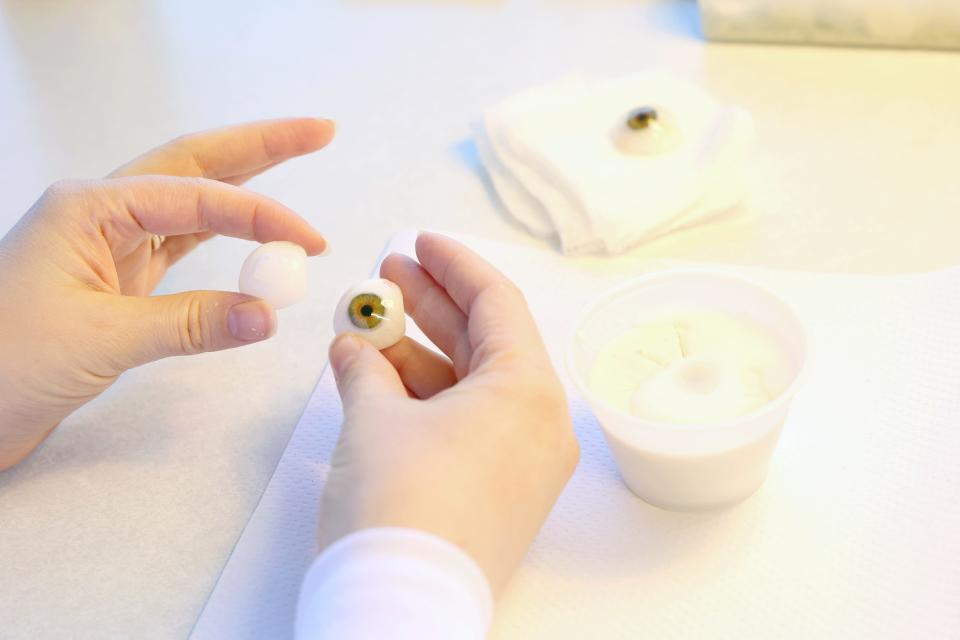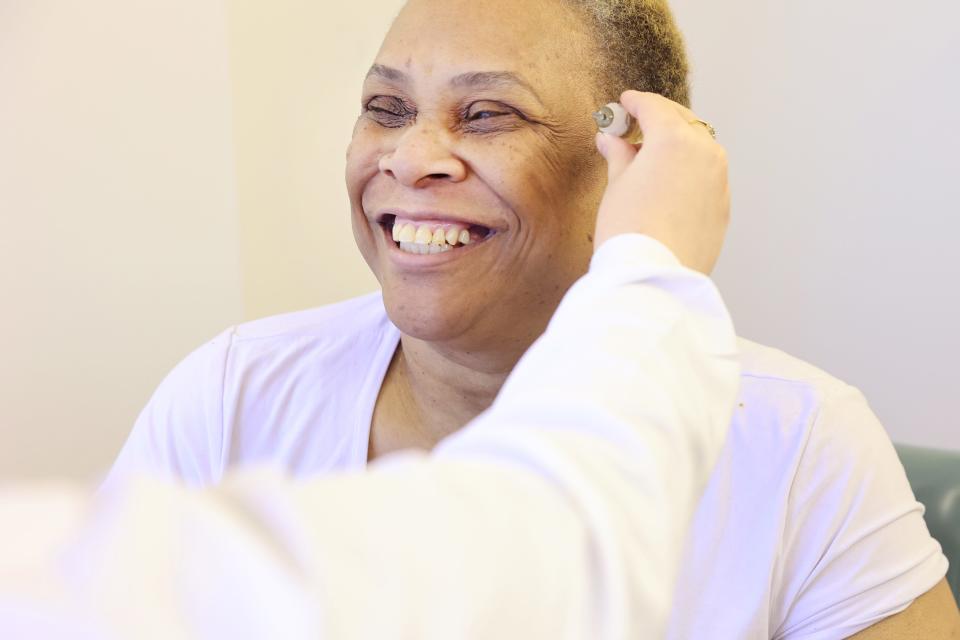'You want it to look perfect because it’s someone’s eye': Ocularists are small group and it's even tougher to get into the industry

Mattie McCormick wants her new eyes to be a “hazel green” color.
She’s hoping her new eyes “make me as beautiful as the last ones was because the color that I chose really brought out my skin complexion.”
“I feel beautiful when I put them in,” McCormick said who lost both her eyes because of glaucoma two decades ago.
McCormick sat in a patient care room at Eye Prosthetics of Wisconsin in Brookfield with her adult daughter Shaina Weyrough who drove her to the appointment from her mom’s home in Kenosha. McCormick has been a client for about 15 years.
“The staff is really friendly, easy going, and make you comfortable,” McCormick said.
There are only a handful of places in Wisconsin that specialize in eye prosthetics as the demand for them has gone down during recent decades.
“In the 60’s and 70’s, you still had all your World War II vets alive and then we had Vietnam and we lost a lot of eyes in Vietnam, so you had all of these people that needed prosthetics,” said Susan Tynes, an ocularist at the facility. “As therapies come in, you’ve got cryotherapy, better medications to save eyes, there’s less people that lose an eye.”
Considerable training required for prosthetic eye craft
But while facilities to treat people with prosthetic eyes are not common, it’s even tougher for someone to get into the industry unless they’re willing to commit a lot of time to the craft.
Sarah Borzon has been an apprentice at Eye Prosthetics of Wisconsin for nearly six years, not including her time at Iowa State getting a degree in biological/pre-medical illustration.

Borzon describes her studies at Iowa State as half studio arts like painting, but also anatomy, physiology and chemistry.
A graduate of Rufus King High School, Borzon said she thought about doing facial prosthetics and heard about an opportunity to job shadow at Eye Prosthetics of Wisconsin while she was in college.
“I just really liked it when I came to job shadow,” Borzon said. “I worked an office job previously and that was just really boring for me.”
A serious candidate for an apprenticeship needs to be willing to commit to 10,000 hours of training and experience. Then, the connect with the American Society of Ocularists, and then, Tynes said, “you have to find somebody who’s willing to train you.”
“That’s the hard part,” Tynes said adding it's difficult to find candidates with the right qualities and motivation.
“I’ve had people come in and say ‘I want to paint. I only want to paint.’ You can’t just sit here and paint all day. You have to have the personality, you have to have the empathy, you have to have the intellect to do it all. So I think sometimes that’s the tricky part. Finding that perfect combination.”
It can be a major time commitment that many people aren’t willing to make.
“A lot of people train their kid. This is nepotism personified.”
Training your competition
A key for Eye Prosthetics of Wisconsin is the understanding that when a person loses an eye, it’s a traumatic, life-altering experience.
“Most of our patients are fabulous people who had a tough situation, and we do the best we can to help them feel normal,” Tynes said.
When asked if she ever gets nervous, Borzon replied “every day.”
“There’s so many little things that can go wrong,” Borzon said. “Obviously, we’re our hardest critics, too. And you want it to look perfect because it’s someone’s eye.”
The fitting process can take several hours to make sure the color is right, to make sure it fits well in the eye socket and that it looks real. Borzon and the other ocularists even add veins using red thread and sealing it into the prosthetic.
When the patient and the ocularist are done with a fitting, the patient will come back after an hour to make sure it fits well. If needed, the ocularists can grind the prosthetic to make sure it fits comfortably.
Prosthetic eyes must be replaced every few years and occasionally impact the patient in other physical ways.
“One thing about having prosthetics, your bottom (eye) lid or your top lid can get loose,” McCormick said. “I had to have surgery to have my bottom lid tight.”
And after the surgery, McCormick had to get new prosthetics to fit right.
There are challenges like doing someone’s first eye, or making prosthetic eyes for children.

Borzon said the work can be especially rewarding.
“You know what you’re doing is really impactful," she said. "And it feels good to be done with work and get a good result, but then also it is like you learn something new everyday too. Just because everyone’s eye is different. ”
Once Borzon complete her classes with the American Society of Ocularists, she said she doesn’t plan on leaving Eye Prosthetics of Wisconsin, but that doesn’t mean the next apprentice would make the same decision.
“I guess it’s kind of a closed society in the fact that you’re basically training your competition, shall we say,” Tynes said. “If Sarah decided at this point that she wanted to walk out and hang up a shingle across the street, technically she has all the tools. We taught her everything we know.”
Multiple challenges for people who lose their sight
McCormick was an electronic technician before she was blind.
“I had 20/20 vision. I started losing my eyesight in 2003, that’s when I had my first eye removed,” McCormick said. “I had my second (eye) removed in 2012 and I’ve been dealing with it ever since. It was a struggle at first. Coming from 20/20 to nothing. I had to readjust to everything and learn how to do things all over again.”
Her self-esteem “crashed.”
“I felt embarrassed about it and I felt like everybody was going to know what it is... then you got to tell the story a thousand times,” McCormick said. “As I grew to learn how to accept my new life doing things differently, you learn how to overcome it and you have the courage to go on.”

While she was learning how to navigate the world, she was a mother to a 3-year-old and a 9-year-old.
“My children had to step up a little earlier unfortunately, and be a little bit more mature because there were things, I needed help with around the house,” McCormick said.
Her adult daughter Weyrough sat with her mom as her eyes were getting fitted.
“It’s hard for her,” Weyrough said. “It’s hard to have a disability like that. The way I see people treat her, sometimes they’ll be rude, sometimes they will treat her like a child, almost. Like she’s not a human being.”
But having prosthetic eyes improves McCormick’s quality of life beyond just the visual appeal.
“They make her feel more comfortable to maneuver in the world,” Weyrough said of McCormick’s prosthetics. “And I feel like she stands out.”
It’s been more than two decades since McCormick lost her eyes, but she has learned she’s not alone.
“I didn’t realize there were so many people with prosthetic eyes,” McCormick said adding she’s met roughly 20 people with prosthetic eyes.
McCormick said her prosthetic eyes help her have more typical, normal interactions with people.
“I’m able to feel comfortable and neutral in front of people without them knowing what I have,” Mccormick said. “A lot of people don’t know unless I mention it.”
This article originally appeared on Milwaukee Journal Sentinel: Eye Prosthetics boosts patients confidence following major losses

